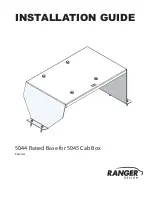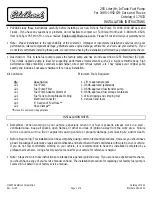
Note: Hydraulic fluid is poisonous; wash off
immediately and thoroughly in the case of skin
contact and seek immediate medical advice if
any fluid is swallowed or gets into the eyes.
Certain types of hydraulic fluid are inflammable
and may ignite when allowed into contact with
hot components; when servicing any hydraulic
system it is safest to assume that the fluid is
inflammable and to take precautions against
the risk of fire as though it is petrol that is
being handled. Finally, it is hygroscopic (it
absorbs moisture from the air) old fluid may be
contaminated and unfit for further use. When
topping-up or renewing the fluid, always use
the recommended type and ensure that it
comes from a freshly-opened sealed container
1 Bleeding is necessary whenever air has
entered the hydraulic system - for instance
after component renewal. Because the
hydraulic circuits are split, if only the front or
rear circuit has been disturbed it will normally
only be necessary to bleed the front or rear
calipers. If the hydraulic unit has been
disturbed or the fluid level has been allowed to
fall so low that air has entered the system,
both front and rear circuits must be bled,
starting with the front
2 The services of an assistant will be required.
As far as is known, pressure bleeding or other
“one-man” equipment cannot be used. In
addition a supply of fresh brake fluid of the
correct type will be needed, together with a
length of flexible tube to fit the bleed screws
and a clean glass or plastic container.
3 Do not allow the hydraulic unit pump motor
to run for more than two minutes at a time. The
motor must be allowed to cool (with the
ignition off) for at least ten minutes after each
two minute spell of running.
4 Remember that brake fluid is poisonous and
that the rear brake hydraulic system may be
under considerable pressure. Take care not to
allow hydraulic fluid to spray into the face or
eyes.
5 Keep the reservoir topped up to the MAX
mark during bleeding.
6 Discard the fluid bled out of the system as it
is unfit for re-use.
Models before April 1992
Front brakes
7 Remove the dust cap (if fitted) from the left-
hand caliper bleed screw. Slacken the bleed
screw, then nip it up again. Make sure that the
ignition is off.
8 Fit the bleed tube over the bleed screw.
Place the other end of the tube in the bleed jar
(glass or plastic container). Pour sufficient
brake fluid into the jar to cover the end of the
tube.
9 Open the bleed screw one full turn. Have
the assistant depress the brake pedal as far as
it will go, and hold it depressed. Tighten the
bleed screw, then tell the assistant to release
the pedal.
10 Repeat paragraph 9 until clean fluid, free
of air bubbles, flows from the bleed screw
during the downstrokes. Remember to keep
the fluid reservoir topped up.
11 Repeat the operations on the right-hand
caliper. Refit the bleed screw dust caps (if
applicable) on completion.
Rear brakes
12 Remove the dust cap (if fitted) from the
rear left-hand caliper bleed screw. Open the
bleed screw one full turn.
13 Fit the bleed tube over the bleed screw.
Place the other end of the tube in the bleed jar
(see illustration).
14 Have the assistant depress the brake
pedal as far as it will go and hold it down.
Switch on the ignition: the hydraulic unit pump
will start and fluid will flow from the bleed
screw.
15 When clean fluid, free of air bubbles,
emerges from the bleed screw, tighten the
bleed screw and have the assistant release the
pedal.
16 Wait for the hydraulic unit pump to stop,
then top-up the reservoir and repeat the
procedure on the right-hand caliper. This time
the brake pedal should only be depressed
half-way.
17 Switch off the ignition, top-up the reservoir
again and refit the reservoir cap. Refit the
bleed screw dust caps (if applicable).
Models from April 1992
18 This operation can be carried out using the
information given above in paragraphs 1 to 10,
ignoring the reference to the hydraulic unit
pump and bearing in mind the following.
19 Note that if only one circuit is disturbed it
will only be necessary to bleed that relevant
circuit on completion.
20 If the complete system is to be bled, it
should be done in the following order.
a) Left-hand front caliper.
b) Right-hand front brake caliper.
c) Left-hand rear caliper.
d) Right-hand rear caliper.
See Chapter 1, Section 44.
1 Whenever the brake pads are inspected,
also inspect the brake discs for deep
scratches, scores or cracks. Light scoring is
normal and may be ignored. A cracked disc
must be renewed; scratches and scores can
sometimes be machined out, provided that the
thickness of the disc is not reduced below the
specified minimum.
2 When the brake pads are renewed, or if
brake judder or snatch is noticed, check the
discs for run-out and thickness variation. (Note
that wheel bearing wear can cause disc run-
out.)
3 Position a dial test indicator probe against
the disc wear face, approximately 15 mm (0.6 in)
in from the outer circumference. Zero the
indicator, rotate the disc and read the run-out
from the indicator (see illustration). Maximum
run-out is given in the Specifications. If a dial
test indicator is not available, use a fixed
pointer and feeler blades.
4 Measure the thickness of the disc, using a
micrometer, in eight evenly spaced positions
around the disc. Maximum thickness variation
is given in the Specifications. Renew the disc if
the variation is out of limits.
1 Slacken the front wheel nuts, raise and
support the vehicle and remove the relevant
front wheel.
2 Remove the two bolts which hold the caliper
bracket to the stub axle carrier. Lift the caliper
5 Front brake disc - removal and
refitting
4 Brake discs - inspection
3 Brake hydraulic system - fluid
renewal
2 Brake hydraulic system -
bleeding
Braking system 10•3
10
2.13 Bleeding a rear brake caliper
4.3 Measuring brake disc run-out
Hydraulic fluid is an effective
paint stripper and will attack
plastics; if any is spilt, it
should be washed off
immediately using copious quantities of
fresh water.
Summary of Contents for Granada 1985-1994
Page 42: ...1 22 Notes...
Page 102: ...2C 22 Notes...
Page 136: ...4 24 Notes...
Page 176: ...11 14 Notes...
Page 196: ...12 20 Notes...
Page 221: ...Wiring diagrams WD 1 WD Diagram 16 Power operated sliding roof...
Page 222: ...WD 2 Wiring diagrams Diagram 2 Power distribution...
Page 223: ...Wiring diagrams WD 3 WD Diagram 2 Power distribution continued...
Page 224: ...WD 4 Wiring diagrams Diagram 3 Charge start and run Part 1...
Page 225: ...Wiring diagrams WD 5 WD Diagram 3 Charge start and run Part 1 continued...
Page 226: ...WD 6 Wiring diagrams Diagram 3A Charge start and run Part 2...
Page 227: ...Wiring diagrams WD 7 WD Diagram 3A Charge start and run Part 2 continued...
Page 228: ...WD 8 Wiring diagrams Diagram 4 Engine management 1 8 litre...
Page 229: ...Wiring diagrams WD 9 WD Diagram 4 Engine management 1 8 litre continued...
Page 230: ...WD 10 Wiring diagrams Diagram 4A Engine management 2 0 litre carburettor...
Page 231: ...Wiring diagrams WD 11 WD Diagram 4A Engine management 2 0 litre carburettor continued...
Page 232: ...WD 12 Wiring diagrams Diagram 5 Engine management 2 0 litre fuel injection...
Page 233: ...Wiring diagrams WD 13 WD Diagram 5 Engine management 2 0 litre fuel injection continued...
Page 234: ...WD 14 Wiring diagrams Diagram 5C Engine management 2 8 litre...
Page 235: ...Wiring diagrams WD 15 WD Diagram 5C Engine management 2 8 litre continued...
Page 236: ...WD 16 Wiring diagrams Diagram 7A Exterior lighting...
Page 237: ...Wiring diagrams WD 17 WD Diagram 7A Exterior lighting continued...
Page 238: ...WD 18 Wiring diagrams Diagram 9 Signalling and warning systems...
Page 239: ...Wiring diagrams WD 19 WD Diagram 9 Signalling and warning systems continued...
Page 240: ...WD 20 Wiring diagrams Diagram 10 Interior lighting...
Page 241: ...Wiring diagrams WD 21 WD Diagram 10 Interior lighting continued...
Page 242: ...WD 22 Wiring diagrams Diagram 12 Wipers and washers...
Page 243: ...Wiring diagrams WD 23 WD Diagram 12 Wipers and washers continued...
Page 244: ...WD 24 Wiring diagrams Diagram 14 Central locking system...
Page 245: ...Wiring diagrams WD 25 WD Diagram 14 Central locking system continued...
Page 246: ...WD 26 Wiring diagrams Diagram 15 Power operated windows...
Page 247: ...Wiring diagrams WD 27 WD Diagram 15 Power operated windows continued...
Page 248: ...WD 28 Wiring diagrams Diagram 21 ABS...
Page 249: ...Wiring diagrams WD 29 WD Diagram 21 ABS continued...
Page 250: ...WD 30 Wiring diagrams Diagram 23 Auxiliary warning system...
Page 251: ...Wiring diagrams WD 31 WD Diagram 23 Auxiliary warning system continued...
Page 252: ...WD 32 Wiring diagrams Diagram 29 Radio cassette player and associated circuits typical...
Page 254: ...WD 34 Wiring diagrams Diagram 11 Heater blower...
















































